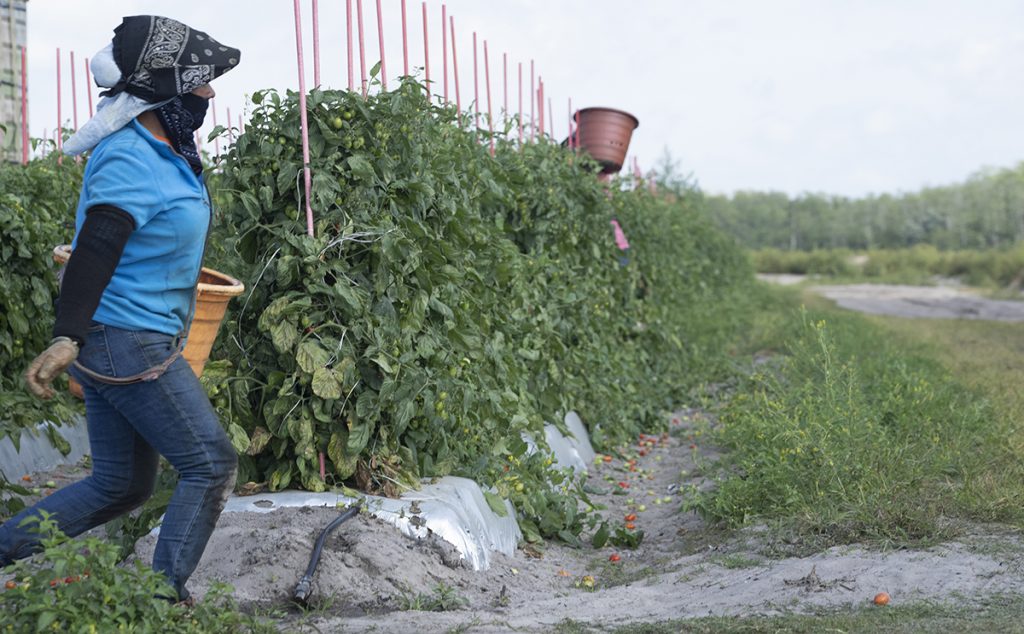We’ve reached the halfway mark of the 2021 Fair Food Sustainer Summer Drive, and we are crushing our goal!
With the goal of 10 new Sustainers every day – and already, 55 people have stepped up to the plate. Help us keep the momentum going by signing up here to become a Sustainer today!
The CIW’s farmworker Education Team starts every on-farm session with this declaration: The “Know Your Rights and Responsibilities” booklet you received on your first day of work here will be nothing but words on paper without the active participation of each and every worker on the crew.
When a sexual harassment case surfaces, when a paycheck falls short, when the heat becomes overwhelming but there is no mandatory shade structure in sight – the Program ensures that workers, as the frontline monitors of their own rights, can report violations without fear of retaliation. That is why real and sustained worker participation is not only a moral imperative of the Fair Food Program, but a practical one as well, the true secret of the program’s unparalleled success. From the creation of the Code of Conduct ten years ago to a worker complaint resolved just this morning, the Fair Food Program is reversing a culture of farmworker abuse by ensuring workers’ voices are heard and respected — every single day.
Becoming a Fair Food Sustainer will help us continue to build a world in which all farmworkers are free to speak up in their place of work, without fear of retaliation or losing their livelihood, in order to protect their basic human rights. Sign up to be one of today’s 10 Fair Food Sustainers!
In their exchanges with Fair Food Standards Council auditors and investigators on Fair Food Program farms, workers often bear witness to the unique power of the worker-driven social responsibility model, and the stories they tell only underscore the urgent need to bring the Fair Food Program to every corner of the country. Here are just a few of those workers’ comments, directly from Fair Food Program fields, gathered over the past season:
One farmworker told auditors that she feels “very comfortable” working with her group, and that all supervisors are “very respectful.” She feels like she is “at home” working at the company. She explained further that she had been sexually harassed when she working in other industries like painting and cleaning, but that at FFP Participating Growers, she feels sure –”me siento segura” – that those things do not happen.
Even as farmworkers across the country struggled to get PPE during the COVID-19 crisis, one worker reported during an audit, “The company gives us disinfectants, towels to clean, and everything we need! We are not missing anything.” Even beyond health and safety, he added: “Before the Coalition of Immokalee Workers, there were slaves … They said ‘after a while you’ll get paid’… But not anymore, thanks to the Coalition.”
Two workers, who spoke both Spanish and Creole, said the Fair Food Program was the first time in their experience that workers had received information in Creole. “We usually try to translate what we hear for our coworkers,” one of them explained. “I speak both Spanish and Creole, but when I saw the Coalition was offering to present in my native language, I thought ‘wow,’ and came over here to listen.”
After an education session, an H2-A worker (a guest worker on a temporary visa) said that he wanted to speak to someone from the FFSC in order to see if anything could be done about the conditions at a non-Fair Food Program company where he had completed an H2-A contract the previous season. At this Georgia farm, he said that there were no protections for the workers there. In addition to housing that was infested with roaches and rats, workers had to labor on in the rain, even with the danger of lightning, and without breaks. He acknowledged that there was a “great difference” between farms in the Fair Food Program and farms outside of the Program. He wanted to know if anything could be done to improve conditions at that farm.
Can something be done? Only if we can expand the Fair Food Program to every farm in the country. Help us grow the Fair Food Program by becoming a Fair Food Sustainer today!

